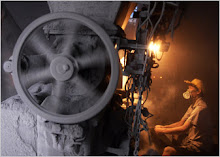So, after tons of effort (going from 190 yes votes in the house to 219 in the space of a week), my organization just had a heavy hand in helping to pass the American Clean Energy and Security Act through the House. The bill is a nationwide attempt to pass a workable cap and trade program, and is the first of it's kind to ever make it out of committee in the House, let alone actually pass.
The bill is troubled. It contains a number of major concessions that may or may not wind up gutting the legislation over time, including but not limited to:
1. Most of the pollution credits are given away initially. This means that the cost of carbon will be very low initially, essentially blunting the intended purpose of the cap and trade program to add extrinsic cost to carbon emissions and thusly incentivize clean energy sources.
2. the Renewable Energy Standard requires that we get 20% of our energy from renewable sources, like wind, solar or geothermal power, by 2020. However, up to 5% of that can come from energy effeciency measures, and governors can petition to get up to 8% from effeciency measures. This is good, but in fact, the stimulus bill just passed will actually do more, and sooner; so this is sort of an afterthought.
3. It stops the EPA from regulating Carbon Emissions from currently existing power plants, a power they got about four months ago.
4. There are all sorts of lame ass rebates for producers of dirty energy, including a provision that madates that rebates to the coal companies be spent up to a certain astronomical amount on 'clean coal' research, a technology that is a fiction and is used by the industry to perpetuate their argument against clean energy investment and innovation.
All of the above are bad things. There a couple things to note about it, however:
1. It does not include money for nuclear power. Given that nukes still create nuclear waste, and our best plan for nuclear waste storage continues to be to ship it on Amtrak to a site that is so far unapproved but sits on a fault line (not to mention the indian burial ground which it displaces, which in and of itself sounds like the plot to a bad movie and implies that we'll wind up with nuclear powered ghosts haunting the joint), this is for the best.
2. It does actually create a national RES, which we didn't have before and is an enforceable standard that for sure will drive the creation of more clean energy.
3. It does include effeciency standards for all new governmental buildings, which is great.
4. It does actually create a cap and trade program, which is the first step towards actually dealing with this problem.
All of the above needs strengthening. But helping to pass this bill reminded me why I settled on the politics of incrementalism to begin with. By continuing to stretch the horizons of those who oppose, continually chipping down the boundaries, we're able to move forward, to continue to gain ground. To those who say that we need more, we need everything, and now, I agree. But up until you get the rest of America to agree with you and can rise up in armed insurrection, your argument will mean that we have to continue waiting. And we can't do that.
That being said, you always have to have a bottom line. This bill couldn't have gotten much more compromised before we would have stopped supporting it. And it will take a lot of work over the next decade to make sure that we strenghthen this thing, and make sure it's actually enforced once the pendulum swings back and people like us are swept from the seats of power.
That being said, this was a statement of intent by the President and the Speaker of the House, who rammed this thing through Congress (I thought inviting swing votes from Congress over to the White House for a Luau, including a 'dunk Rahm Emmanuel' booth, was a stroke of genius). These guys actually care about this, and though passing this thing was hard as hell and they had to give up some ground, they got it done. The opportunity will likely never be better, and they had the balls to take it.
Now let's hope that Harry Reid can take a cue from the Lady of San Francisco. I hope he's half the man she is.
